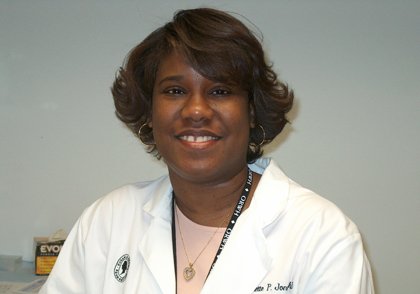BALTIMORE — Laundette P. Jones will never forget the conversation she had with her softball coach whom she fondly remembers as “Coach Bradford” when she was a student at Fairmont Heights High School located in Capital Heights, Maryland.
“He put the seed in my head about college,” she recalled. “He asked me what I was going to do after college. I told him I was interested in becoming a secretary because I could type. He looked at me strangely and told me I should go to college. I did not think college was an option for me.”
As Jones saw it, the odds were stacked against her. While she excelled academically, she knew her parents could not afford to send her to college. In addition, she and her family were homeless.
“Coach Bradford pointed me to guidance counselors who helped me to apply to schools,” she recalled. “It started with a full scholarship to Morgan State University and grew from there.”
Today, Laundette P. Jones is Dr. Laundette P. Jones, assistant professor at the University of Maryland School of Medicine. She works in the Department of Pharmacology and is also a breast cancer researcher.
Dr. Jones uses the gospel song, “We’ve Come This Far By Faith” to describe her life’s journey.
“I realize that everything in my life has been through God,” said Dr. Jones. “God helped me to get to this position.
I know that God strategically places people in our lives to make-up for what we lack. The world teaches that you have to do it on your own, and to pull yourself up by your bootstraps. But God places people in our lives to help us get there. That’s why God gives us community.”
A native of Prince George’s County, Maryland, Dr. Jones reflected on her childhood.
“I grew up in a family of five and my dad was the only one working,” said Dr. Jones. “I recall coming home one day and seeing our things outside. We went to Greenbelt Park and lived outside on the grounds in a tent. While we were homeless, the level of discipline and consistency was normal. We went to school, attended church and ate together as a family at the same time every day. I didn’t realize I was poor until I began attending high school.”
She added, “We just had the basics and never had the designer clothes like the other kids wore. Our shoes came from the grocery stores back when they used to sell them. I swore I was middle class. Unless the kids told me or I could see the differences, being poor just didn’t register.”
According to Dr. Jones, the family lived in the tent until the pastor of a church in Prince George’s County allowed the family to stay in the church.
“The church accepted us even though we were homeless,” said Dr. Jones. “I am a witness to the fact that God places people in our lives to give us just what we need.”
She added, “Sometimes, we as people will look at our circumstances and compare ourselves to other people. However, if given the opportunity, we have to make the most out of those opportunities.”
She made the most of her scholarship opportunity at Morgan State University. She graduated, and went on to attend Johns Hopkins University, where she earned her Ph.D.
Prior to joining the faculty at the University of Maryland Baltimore, she worked for the National Institute of Health (NIH) and Georgetown University.
“When people are homeless, it’s not the end of the line,” said Dr. Jones. “Telling my story gives people hope. I believe God has placed me here to be an inspiration to others.”
On Thursday, September 19, 2013, Dr. Jones participated in the second annual Project Homeless Connect-Baltimore at the Baltimore Convention Center as a volunteer. The event was sponsored by the United Way of Central Maryland and the Baltimore City Mayor’s Office of Human Services, Homeless Services Program (MOHS-HSP).
The event provided on-site services for the local homeless community, such as medical exams and screenings, haircuts and legal advice.
“It’s so important that we help others. God places people in our lives to help them. The person you are helping could be the next lawyer or doctor.”
Dr. Jones recalled another conversation with “Coach Bradford” that she will never forget.
“I went back to Fairmont Heights High School and found Coach Bradford to thank him,” she said. “I owed it to him to tell him thanks for seeing something in me that I did not see in myself. He was really moved. There were many others who helped, but it started with him.”
